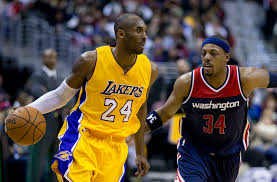Yesterday at 10:30 p.m., the 16-65 Los Angeles Lakers played their final game of the NBA season, a meaningless contest that had a real shot at challenging regular season ratings records, because Kobe Bryant’s employment with the team will end immediately after.
Yes, as everyone knows, Kobe is retired. It wasn’t a surprise when he announced his imminent personal finale in late November (with a poem!), and no one believes he is making the wrong decision. Kobe has been awful this season — his athletic burst is kaput, he isn’t coming close to playing passable defense in the hyper-fast NBA and he is shooting just above 35 percent on the season. His lowlight reels have become something of a Twitter commodity, GIFs and Vines passed around by gleefully snickering commenters of, say, Kobe being unable to shake DeAndre Jordan and having his shot crushed by the 7-footer, reminiscent of a bored older sibling playing Nerf basketball with an overeager 9
year old.
Still, Kobe is one of the greatest players of all time, probably the second best off-guard after his idol, Michael Jordan. Everyone also knows this. Part of the fun of this Kobe season has also been the rare (very rare) flashes of his former greatness, like when he dropped 31 in a win on my sorry, no good, fraudulent, sham-of-a-favorite-team Washington Wizards. This year doesn’t “ruin his legacy,” obviously: athletes get old. Athletes get injured. Athletes start to play badly, or at least not as well. This is uniformly true, and Kobe is no exception.
But, what exactly is Kobe’s legacy? Right, one of the best of all time — we already covered that. I mean, more abstractly, what has been his impact on the NBA, on the culture? It seems to me, when considering this question, Kobe is something like the last of his kind. That terminology almost always feels trite and unsubstantiated to me, a close cousin to the tired old “they don’t make’ em like they used to” refrain of Golden Era thinkers blinded by nostalgia. Yet, in Kobe’s case, it seems true. It is possible that the end of this season could also see the retirement of Vince Carter, Paul Pierce, Kevin Garnett and Tim Duncan—the post-Jordan Y2K generation finally stepping back from the association. None of them, though, quite had Kobe’s sustained impact, and none his exact legacy.
Kobe, it seems to an outsider like me, took pride in being hated. And there’s a part of me that respects him for that, especially in contrast with the social media brand-bots who make up so much of professional sports now. They sell themselves and the products they sponsor with likability and image. Certainly, Kobe is aware of his image, but I sincerely believe he never much had time for being likable. I find that refreshing, and I might even find it honest.
Then again, he also teetered on the line between admirable gruffness and true abhorrent behavior quite often. He infamously shut out teammate Smush Parker for not being good enough, has admitted to making teammates cry and broke up his nearly dynastic team with Shaquille O’Neal because they couldn’t get along. Most disturbingly, he was accused of rape in 2003, a stain on his career that strikes me as, if anything, being the most obvious signal of how attitudes have changed. It’s hard to imagine this much mainstream adulation pouring out for a public figure accused of such a heinous crime today, and that’s undoubtedly a good thing. Just as the Internet has given us brand-obsessed athletes, it has provided larger and louder forums for the victims of sexual assault, and more people than ever are being held accountable.
So what if Kobe Bryant is just an excellent jerk? If he’s a transcendent talent and worker who just also happened to be a raging bully? Thinking of it that way, concerns over era and social media proliferation seem less important. There have always been successful jagoffs, and there always will be. Kobe’s legacy, then, is maybe more so a reminder: Like other masters of their craft, he isn’t expected to owe us anything, niceness least of all.
Then again, would it have killed him to try anyway?
Ely Vance is a senior English major. He can be reached at evancedbk@gmail.com.



